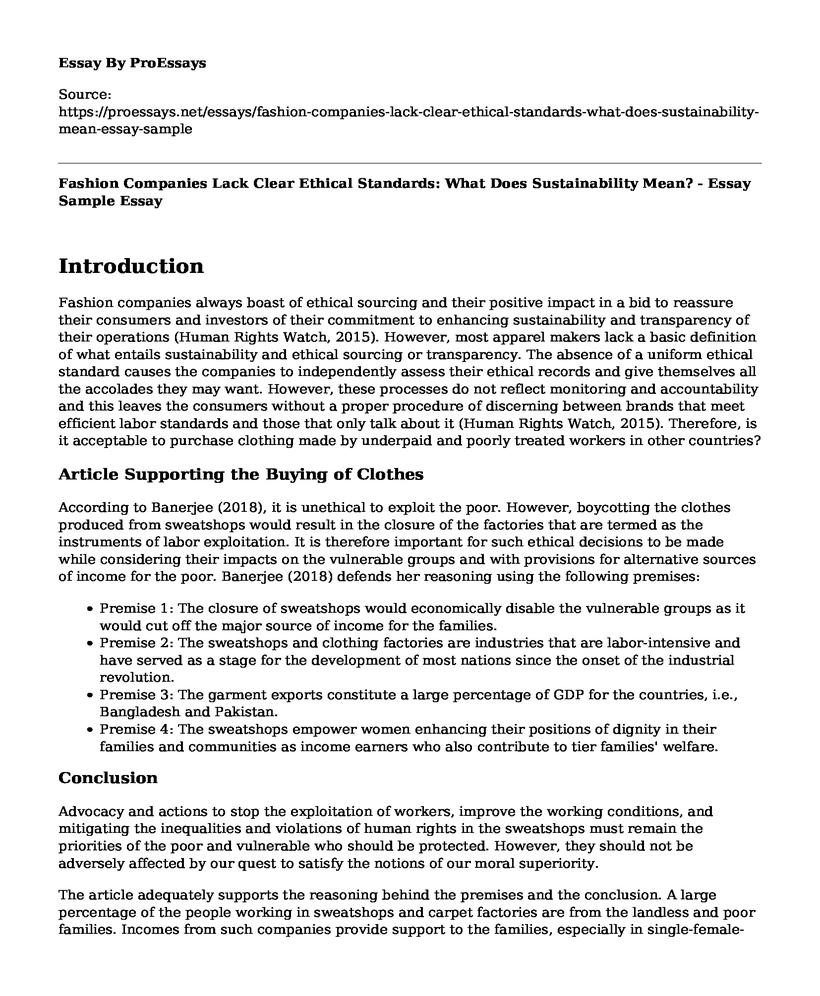Introduction
Fashion companies always boast of ethical sourcing and their positive impact in a bid to reassure their consumers and investors of their commitment to enhancing sustainability and transparency of their operations (Human Rights Watch, 2015). However, most apparel makers lack a basic definition of what entails sustainability and ethical sourcing or transparency. The absence of a uniform ethical standard causes the companies to independently assess their ethical records and give themselves all the accolades they may want. However, these processes do not reflect monitoring and accountability and this leaves the consumers without a proper procedure of discerning between brands that meet efficient labor standards and those that only talk about it (Human Rights Watch, 2015). Therefore, is it acceptable to purchase clothing made by underpaid and poorly treated workers in other countries?
Article Supporting the Buying of Clothes
According to Banerjee (2018), it is unethical to exploit the poor. However, boycotting the clothes produced from sweatshops would result in the closure of the factories that are termed as the instruments of labor exploitation. It is therefore important for such ethical decisions to be made while considering their impacts on the vulnerable groups and with provisions for alternative sources of income for the poor. Banerjee (2018) defends her reasoning using the following premises:
- Premise 1: The closure of sweatshops would economically disable the vulnerable groups as it would cut off the major source of income for the families.
- Premise 2: The sweatshops and clothing factories are industries that are labor-intensive and have served as a stage for the development of most nations since the onset of the industrial revolution.
- Premise 3: The garment exports constitute a large percentage of GDP for the countries, i.e., Bangladesh and Pakistan.
- Premise 4: The sweatshops empower women enhancing their positions of dignity in their families and communities as income earners who also contribute to tier families' welfare.
Conclusion
Advocacy and actions to stop the exploitation of workers, improve the working conditions, and mitigating the inequalities and violations of human rights in the sweatshops must remain the priorities of the poor and vulnerable who should be protected. However, they should not be adversely affected by our quest to satisfy the notions of our moral superiority.
The article adequately supports the reasoning behind the premises and the conclusion. A large percentage of the people working in sweatshops and carpet factories are from the landless and poor families. Incomes from such companies provide support to the families, especially in single-female-headed families.
Article Against the Buying of Clothes
WIEGO (2020) provides an analysis of the challenges experienced in the garment industry to establish policies that would be favorable to the workers. According to WIEGO (2020), the garment industry exemplifies the challenges of global production. The article argues that most of the clothes people wear are made in areas where the rights of the workers are either non-existent or not respected. WIEGO (2020) supports its reasoning basing on the following premises:
- Premise 1: Most of the clothes are made in countries where the rights of the workers are nonexistent or limited with the production sites frequently looking for cheaper labor costs.
- Premise 2: The homeworkers are paid by the piece, earn very little, and do not receive any overtime pay with no sick leave or paid vacations.
- Premise 3: The health and safety conditions of the workplaces are compromised with the buildings being unsafe with no ventilation systems, and the employees inhale fiber dust and toxic substances.
- Premise 4: The industry incorporates the use of child labor since it requires low-skilled labor.
- Premise 5: In most of the factories, the garment workers are not allowed to establish workers' unions to defend their rights collectively.
Conclusion
The garment workers should organize to increase their bargaining power and security in the globalized trade. Organizing would help to improve the situation for the workers.
The reasoning in the article is strong as it conclusively relates the premises and the conclusions to the problem. There is an efficient use of examples and data to showcase the extent of the problem and the roles played by unions such as the Self-Employed Women Association (SEWA) in India to control the vices.
Evaluation of Arguments
Banerjee (2018) supports the act of purchasing clothes from the industries. The scholarly source targets the consumers of the products in a manner that would spur critical thinking with a passion for development. The source provides the logical thought that in the quest to boycott the products, sweatshops remain the first choice for employment for vulnerable populations. The source supports the purchasing of the clothes and the act of boycotting them should ensure that the vulnerable population has alternative sources of income.
WIEGO (2020) provides an analysis of the general problems experienced by workers in the garment industry. The source targets the vulnerable groups and enlists the problems with the hope that appropriate policies will be implemented to solve the problem, including the establishment of workers' unions to improve the worker's bargaining power.
Conclusion
To conclude, both articles make sense and this makes it cumbersome to make a stance since the matter resonates on an ethical basis. In this case, further research should be conducted to weigh the various options and appropriate decisions taken. This study will positively impact how I conduct my research in the future by enabling me to understand how various scholarly articles relate and contribute to the topic.
References
Banerjee, N. (2018). The ethics of buying clothes produced in sweatshops. Center for International Policy Studies. https://www.cips-cepi.ca/2018/02/26/the-ethics-of-buying-clothes-produced-in-sweatshops/
Human Rights Watch (2015). Workers' rights in Bangladesh's garment factories. Humanrightswatch.org. https://www.hrw.org/report/2015/04/22/whoever-raises-their-head-suffers-most/workers-rights-bangladeshs-garment
WIEGO (2020). Garment workers. Wiego.org. https://www.wiego.org/garment-workers
Cite this page
Fashion Companies Lack Clear Ethical Standards: What Does Sustainability Mean? - Essay Sample. (2023, Jul 24). Retrieved from https://proessays.net/essays/fashion-companies-lack-clear-ethical-standards-what-does-sustainability-mean-essay-sample
If you are the original author of this essay and no longer wish to have it published on the ProEssays website, please click below to request its removal:







